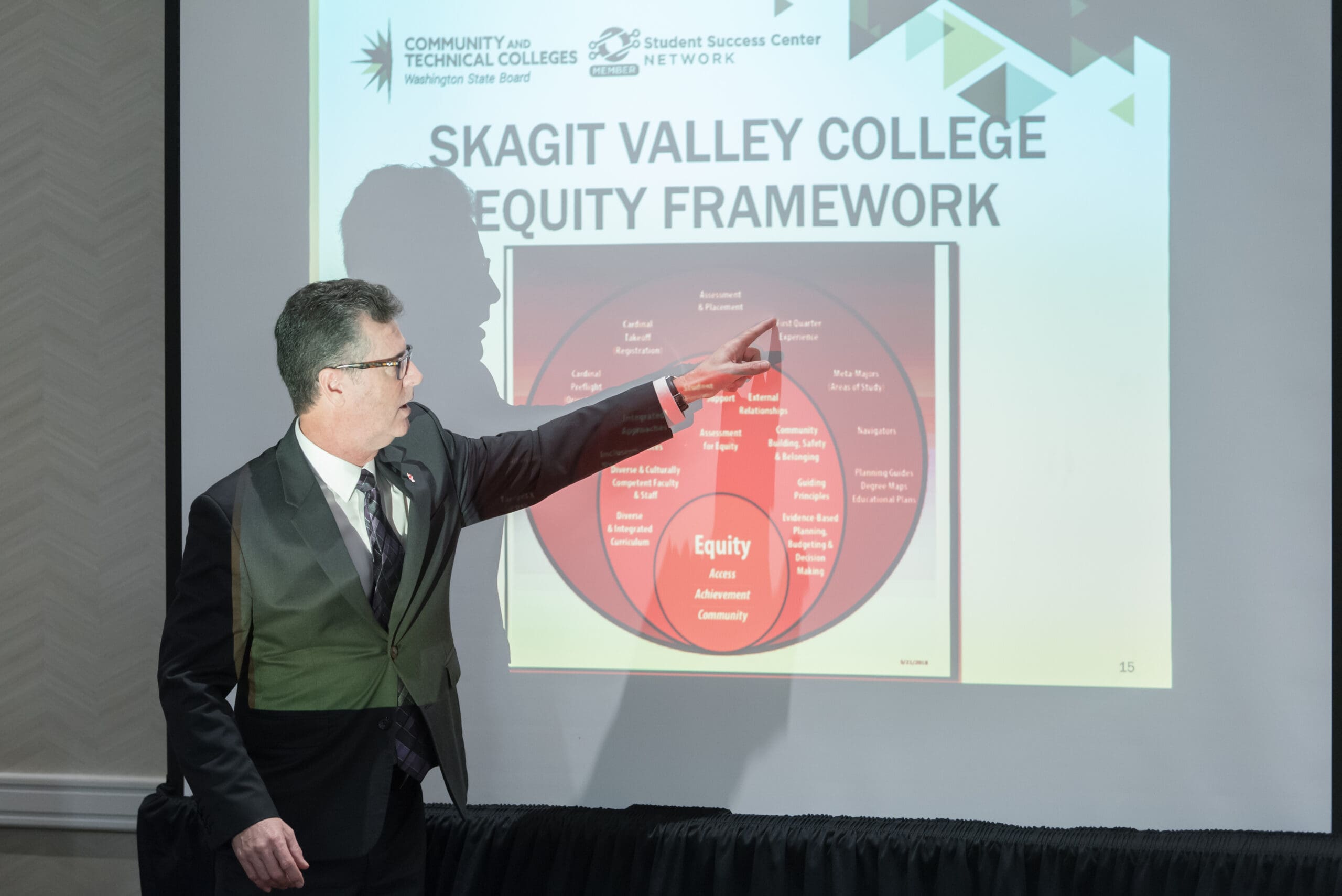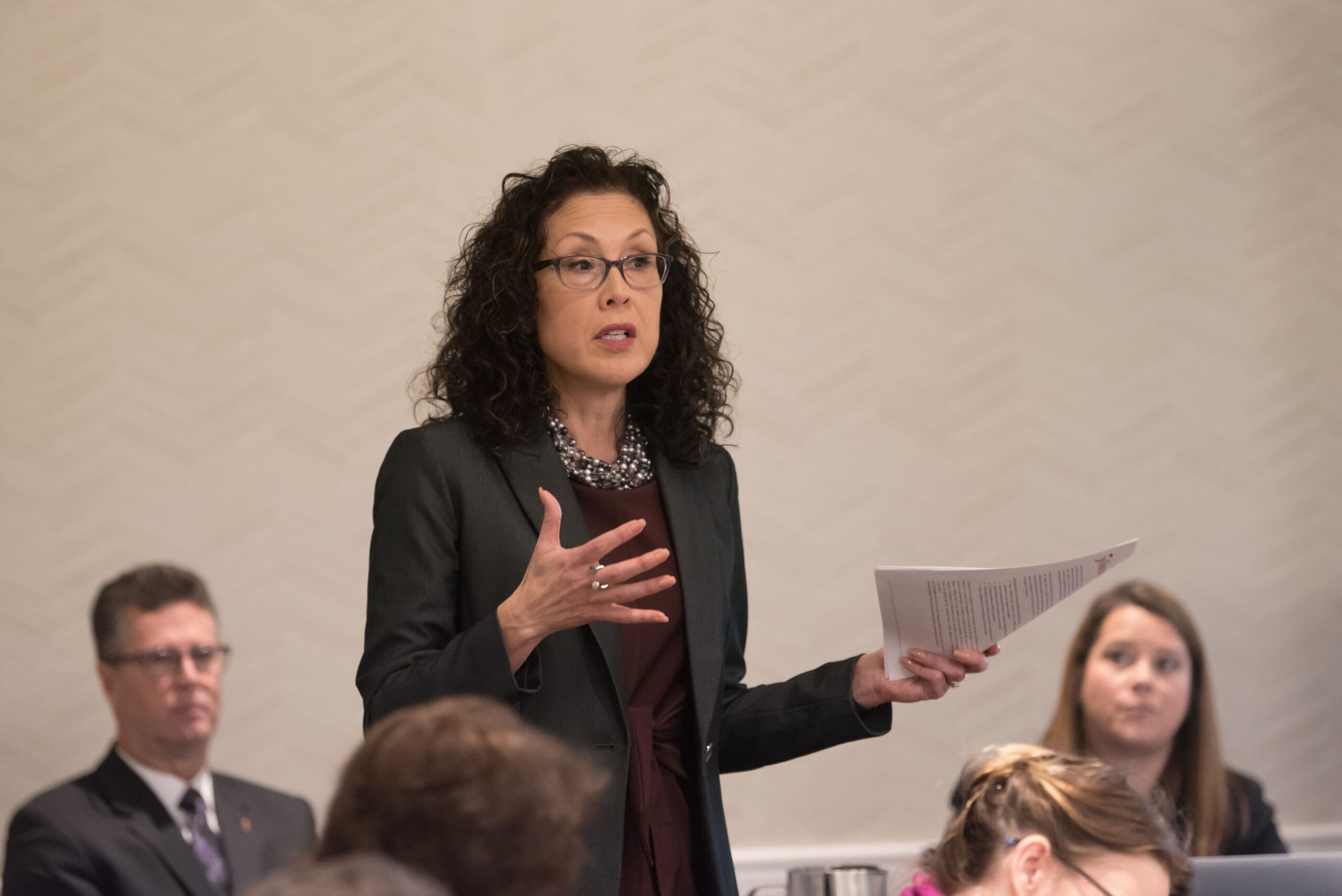
Can They Work Together on Equity? Washington State Says Yes
May 2, 2019
By Jennifer Giffels, senior program manager
Seven years ago, Tom Keegan, a Skagit Valley College alumnus, returned to the community college as its president. Skagit Valley was the school that set him on his educational and career path, so he was surprised to learn that it had low student success rates.
Working with the board of trustees, faculty, and staff, Keegan facilitated the development of key student success indicators. Soon thereafter, he shared the “brutal facts” with the college community. The data revealed low success rates in areas such as first quarter to second quarter retention, first year to second year retention, and college-level English and math completion. The data also showed unacceptable equity gaps.
Keegan’s story is emblematic of the equity-minded movement afoot across Washington State. College practitioners and state leaders hail the importance of work at the grassroots and statewide levels in closing the equity gap.
At the state level, the Washington Student Success Center (SSC), part of JFF’s national Student Success Center Network, is playing a key role in supporting this systemic approach to raising completion rates and closing equity gaps across the state’s community and technical colleges, where 45 percent of the students are people of color.

At Skagit Valley, Keegan challenged the unacceptable student outcomes and equity gaps. He led the campus in developing a student success strategy grounded in equity. The work began with a look at the college’s underlying values, which he noted could be both clear-cut and unspoken.
For example, “What are the messages on the website? Do you see Spanish and English on signs?” Keegan asked. “From there, you can get to cultures and values, to the questions of who we are and what grounds us.” From there, Skagit Valley established its core values as “equity in access, achievement, and community.” Every strategy and program at the college would flow from those core values.
Skagit began using data to gauge progress in its equity goals and to inform budgetary decisions. Each department now has to show how its practices are addressing equity gaps and demonstrate marked improvements in student outcomes. For example, the college found that fall-to-winter student retention rates improved when new students were required to take a “first-quarter experience” course—an introductory class that helps students sort out their approach to academics and map out career, financial, and life plans. In addition, math completion rates have also improved, overall and for Latinx and Hispanic students.
While improvements can rarely be attributed to one factor, Keegan stressed the importance of holding equity as a grounding principle.
As practitioners, we think we know what the community needs, but we don’t. It is our responsibility to listen to the community.
Maria Peña, chief diversity and equity officer, Everett Community College
The SSC’s Role
The Washington Student Success Center, which is housed within the Washington State Board of Community and Technical Colleges (SBCTC), convenes colleges to share practices for improving student success and closing equity gaps.
The SSC offers a number of services, and specifically does the following:
- Provides data and tools to inform and assess each college’s progress
- Engages in statewide efforts to set equity priorities and include them in policy decisions
- Co-creates a statewide learning agenda with the Guided Pathways Advisory Council
The SSC is part of Washington’s complex postsecondary system, which includes 34 technical and community colleges, each with a board of trustees; an organization of college presidents; the SBCTC and its nine-member board; and the SSC’s advisory group, which is focused on guided pathways.
The postsecondary “structure can lead to some great synergy,” said Keegan. But, he added, “it also can lead to the opposite, if we aren’t conscious all of the time of having a system agenda that we’re all willing to advocate for.”

Kristi Wellington-Baker, executive director of the Washington SSC, worked with the Center’s Guided Pathways Advisory Council to help craft the system agenda on equity. The committee had representation from different commissions across the state–including college presidents and vice presidents, as well as other key executive cabinet representatives, including chief equity and diversity officers. The group also worked with Community College Research Initiatives at the University of Washington to help them develop a vision, a mission, and guiding principles.
Wellington-Baker said it was exciting and motivating for the group to work toward a system that advances racial, social, and economic justice by emphasizing equitable student outcomes. She added that she is dedicated to leading the SSC in a way that acknowledges historical and present-day realities and working with all groups toward equitable student outcomes statewide.
The Center also embedded equity with the administration of the Scale of Adoption Assessment (SOAA), a self-assessment tool that colleges use to track their progress in implementing guided pathways. The SOAA tool was developed by the Community College Research Center (CCRC) and is used nationally by colleges in the SSC Network and beyond. A team from Washington State led by Maria Peña and Keegan worked with the CCRC to add questions to the tool to reflect how important equity is throughout guided pathways implementation.
The SSC has also made equity a strong focus of its past and future guided pathways institutes. From her vantage point at the center, Wellington-Baker said that she sees “all of the work that’s happening on the campuses is beginning to influence campus-wide operations and state-level policy.”
The system may have created inequity, but we are part of the system now. So it’s our job to change it.
Maria Peña, chief diversity and equity officer, Everett Community College
Taking Individual Responsibility at Everett Community College
Maria Peña, the chief diversity and equity officer at Everett Community College, shared her college’s approaches to strengthening the 5 Dimensions of Equity—access, aspiration, engagement, achievement, and economic progress. Representing the voices of many, the 5 Dimensions of Equity speak to the aspirational vision of the college to transform itself into an equity-minded organization.
Peña noted that she was one of three diversity officers in the Washington community college system when she started four years ago. Today, she said, that number has grown to 12, and another six will soon join them.
Peña is charged with leading her college’s efforts to address both structural and transformational change. To do this, the college listens to the community first, allowing grassroots ideas and opinions to percolate to the top.

“As practitioners, we think we know what the community needs, but we don’t,” Peña said. “It is our responsibility to listen to the community.”
Pena said structural change includes developing capacity, building partnerships, creating a shared language and understanding, and designing the college’s 10-Point Equity Framework. The framework focuses on cross-institutional representation and collaboration to promote equity in 10 areas, including campus culture, curriculum, infrastructure, and professional development.
Transformational change addresses individuals’ and institutions’ beliefs, assumptions, actions, and purposes. “This is the work of understanding that we all are part of a racist system,” Peña said. “This is where people ask what their role in the system is, and we discuss why this work is important.”
For example, curriculum is one of the 10 points in the equity framework, which promotes inclusive pedagogy, professional development, and supportive faculty. Faculty members are incorporating an understanding of power and privilege into how they teach their classes. The college has faculty-led communities of practice to dive deeper into conversations about the 5 Dimensions of Equity, inclusive pedagogy, and power and privilege.
Peña described this effort as the work of culture change, of transforming Everett into an equity-minded organization, by taking responsibility to address systemic problems. “It’s about how we treat each other and what kind of world we want to have, all with a long-term view,” she explained. “The system may have created inequity, but we are part of the system now. So it’s our job to change it.”
Peña is an example of an individual taking action to make an impact at the institutional level, and then partnering at the state level–with the SSC–to spread the change statewide.
Ultimately, Peña said, “no system will change without organizational change. No organization will change without individual change.”
Thank you to Tom Keegan, Maria Peña, and Kristi Wellington-Baker for sharing their stories about Washington’s equity journey during a breakout session at JFF’s Postsecondary State Network Meeting in Austin, Texas, in January 2019.
More from JFF

Student Success Center Network (SSCN)
This national network scales proven practices to help more than 4.5 million students earn credentials that lead to well paying jobs. Nearly half of U.S. community colleges are connected to the Student Success Center Network.…

Postsecondary Network
Reforming math in Florida, ensuring equity in Washington, boosting student support in Michigan, partnering with the workforce system in New Jersey—JFF’s renowned network advances policies and practices that help all students attain high-value credentials. Reforming…

How Ohio Community Colleges Use ROI to Make the Most of Student Success
Mapping a PathForward: Lessons Learned Colleges are receptive to ROI concepts but identifying initiatives can be challenging. Colleges examined ROI across a variety of student success initiatives, including a redesigned advising model, a cohort-based intensive…

A Message to Community Colleges: You Are the Launchpad for Equity
At a meeting of JFF’s Postsecondary State Network, community colleges leaders get a call to be the change agents for achieving equity. The charge: Look for new ways to use data, ask different questions, and…